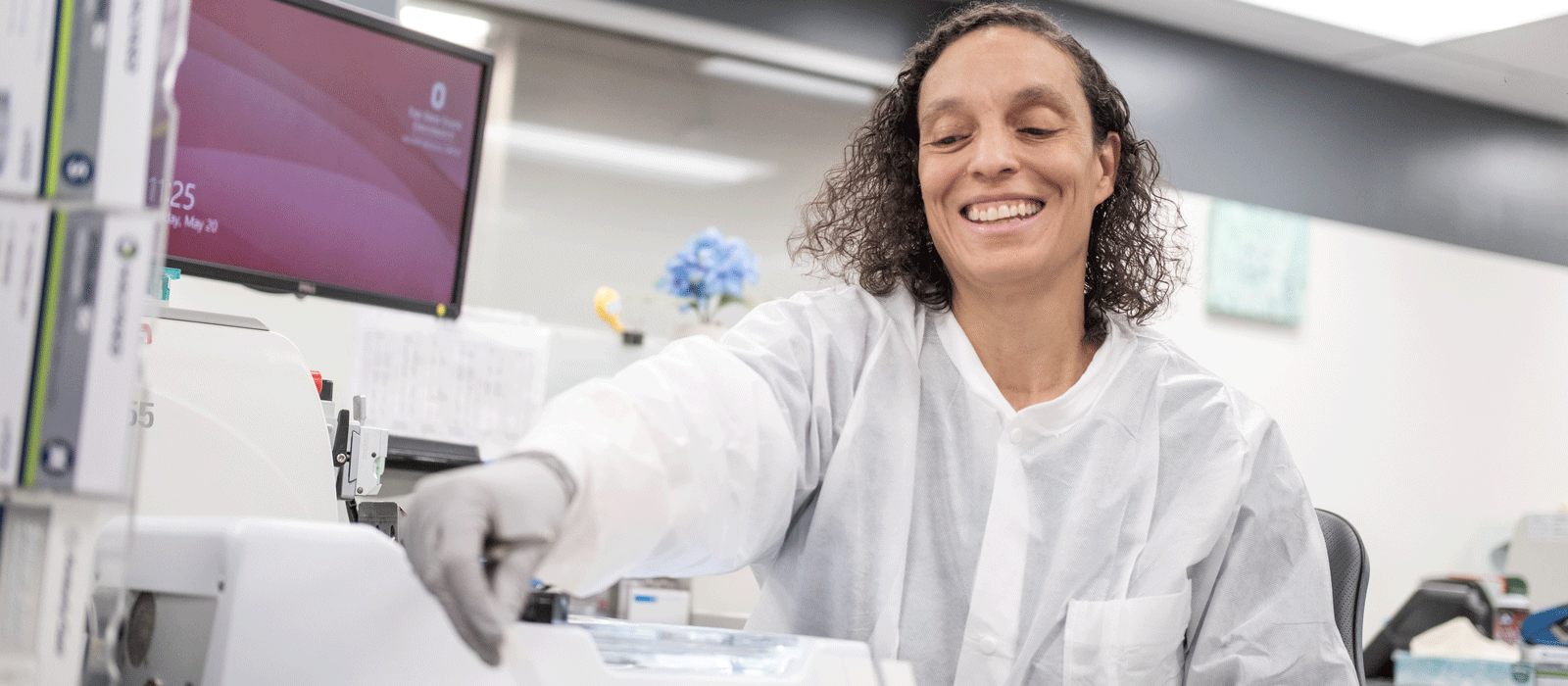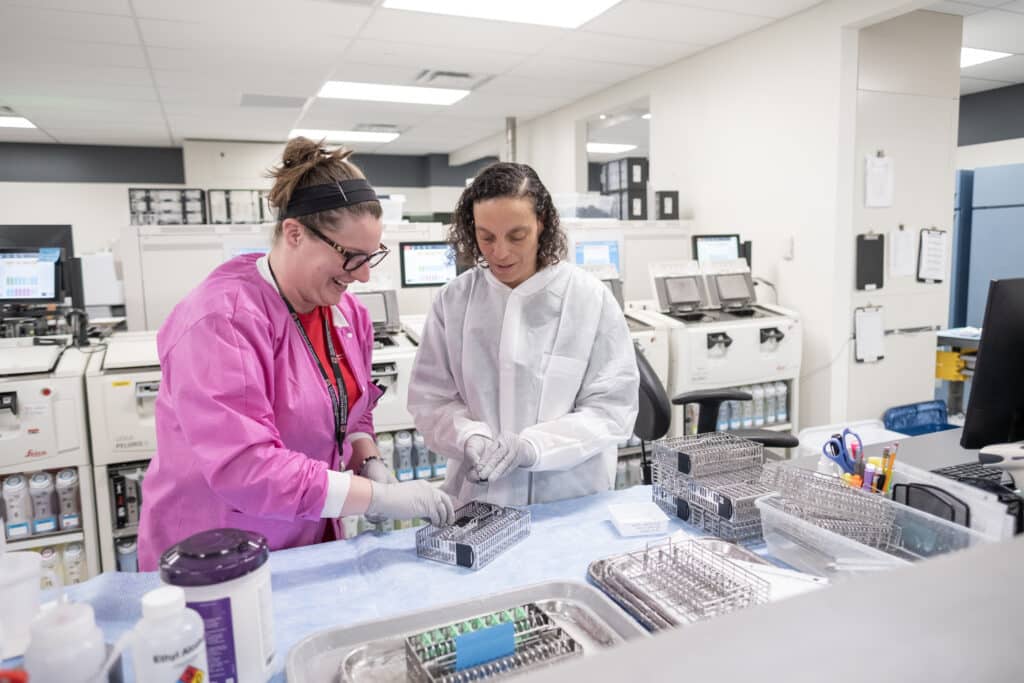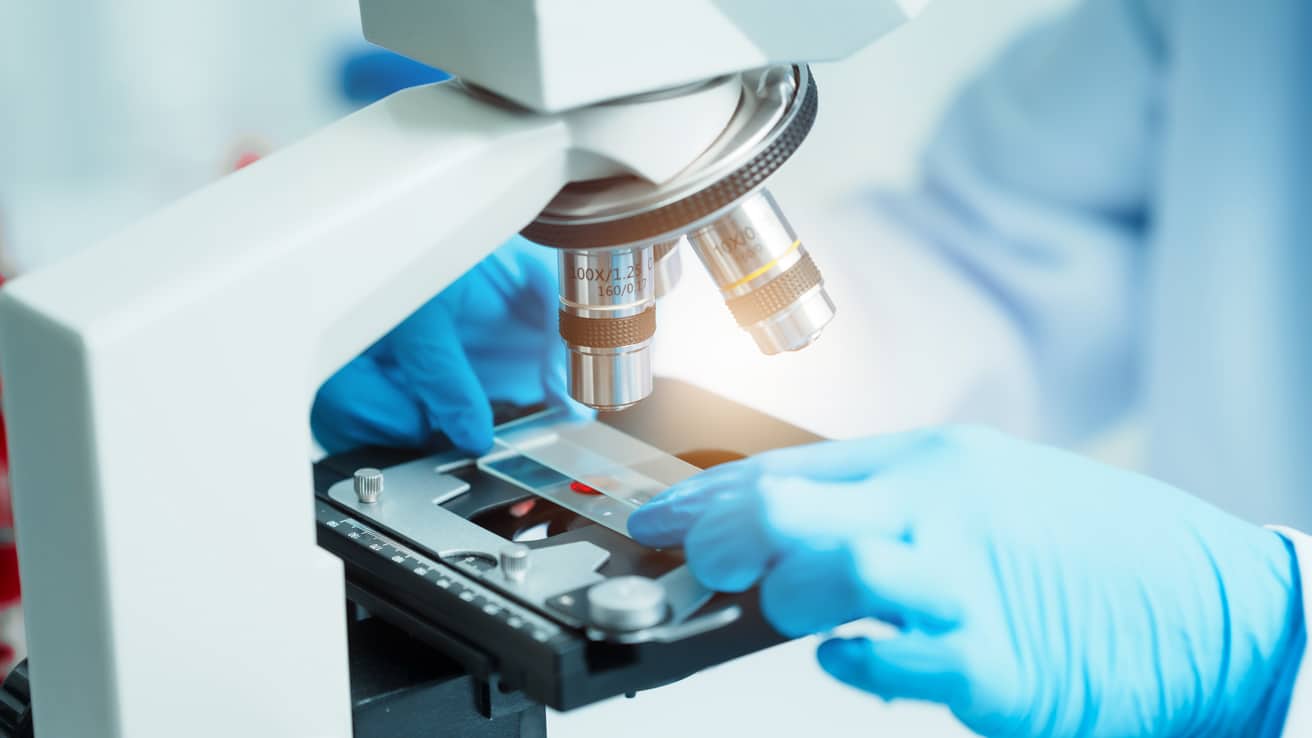From Phlebotomist to Medical Laboratory Scientist (MLS): Tiffany’s Journey

When Tiffany Pinto first entered the health care world, she imagined herself helping patients as a nurse. But life led her to discover a different yet equally impactful way to serve patients through the clinical laboratory. Today, Tiffany is a proud graduate of The Ohio State University Medical Laboratory Science (MLS) bachelor’s program, and she works as a Histology Technician at The Ohio State University Wexner Medical Center. Her story reflects a journey of exploration, education, and commitment to patient care behind the scenes, where science meets compassion.
A vital role in patient care
Tiffany Pinto, MLS (ASCP)CM, HTL (ASCP)CM, currently works in the Anatomic Pathology department’s Histology Lab at the Ohio State Wexner Medical Center as a Histology Technician. Her work is crucial in preparing tissue samples that pathologists examine to diagnose diseases and guide treatment plans.
“In my role, I am involved in processing tissue samples, mounting them on glass slides and performing specialized staining techniques,” Tiffany explains. “Some slides are stained using immunohistochemistry (IHC), which employs antibodies to target specific antigens in tissue. This helps pathologists diagnose disease and find appropriate treatment targets, especially for cancer patients.”
Her daily work directly supports physicians and impacts patient outcomes, yet it all started with a different dream.
From nursing aspirations to laboratory science
Tiffany originally considered nursing as her career path, but she realized bedside care wasn’t the best fit for her.
“I accepted that nursing wasn’t quite right for me, but I still wanted to work in health care,” Tiffany reflects. “Living a life of service to others is very important to me. I wanted to find a way to help patients receive quality care and better outcomes without necessarily being at the bedside.”
That desire led her to enroll in a phlebotomy certification program, where she first learned about the clinical laboratory and its essential role in patient care.
“I saw phlebotomy as a great opportunity to quickly learn a health care skill and gain employment in a hospital setting,” she says. “It gave me exposure to the many different jobs in health care and helped me figure out what I wanted to pursue.”
For over two years, Tiffany worked as a phlebotomist collecting blood samples that were critical for diagnosing and treating patients.
“I learned a lot about health care during those years and how important it is to obtain quality specimens so doctors can make accurate decisions,” she says.
Meanwhile, Tiffany completed her Associate of Science in Medical Laboratory Technology (MLT) at a community college and set her sights on further advancement.
The next career step after phlebotomy
Tiffany credits her phlebotomy instructor for encouraging her to consider the MLT program as the next step in her career.
“My instructor saw my inquisitive nature and suggested I look into medical laboratory science,” Tiffany says. “I’m naturally curious and always asking questions. The lab is a place where you can explore the complex, interconnected systems of the human body, from white blood cells to microorganisms to genetics. It felt like being an astronaut, but exploring the universe inside the body.”
After completing her MLT, Tiffany worked for about eight years in various hospital labs, gaining experience in hematology, clinical chemistry, immunochemistry, transfusion services and even assisting with bone marrow biopsies.
“I worked as a generalist, doing complete blood counts, coagulation tests, urinalysis and body fluid analysis,” she explains. “I helped ensure safe blood transfusions by performing blood typing and antibody screens. These years gave me broad experience and a deep understanding of how lab work supports patient care.”
Pursuing medical laboratory science as an MLT
With a solid foundation as an MLT, Tiffany was ready to advance her education and career.
“I always knew I wanted to earn my MLS degree,” she says. “It opens up so many more opportunities in the lab, like molecular diagnostics, cytogenetics, flow cytometry, areas closed off to MLTs. I wanted to avoid limitations in my career.”
The opportunity came through Ohio State’s MLS program, which she attended in-person while working at The Ohio State University Wexner Medical Center.
“The program was well-structured and rigorous,” Tiffany recalls. “The faculty really care about student success, not just in the program but in passing the certification exam and succeeding in their careers.”

Career growth as an MLS
After earning her MLS, Tiffany took on greater responsibilities, becoming the key operator for the immunochemistry analyzer at the Ohio State Wexner Medical Center.
“In that role, I managed supplies, quality assurance (QA) monitoring, and prepared reports for the medical director,” she explains. “The transition from MLT to MLS was seamless because the work is similar, but MLS training adds knowledge in QA, management and accreditation.”
Tiffany emphasizes how every lab result influences patient care.
“Every tube of blood, every slide tells a story that impacts patients and families,” she says. “We ensure specimens are collected and tested accurately. The quality of our work directly affects the quality of care clinicians can provide.”
Continuing education in histology
Tiffany’s passion for learning led her to pursue a histotechnology certification at Ohio State.
“I kept my dream of studying histology alive,” she says. Tiffany has now completed her histology certification and can add one more credential to her name, HTL (ASCP)CM.
Her histology work involves preparing tissue slides that pathologists rely on for diagnosis, using advanced staining methods such as immunohistochemistry.
“Histology is a fascinating field,” Tiffany reflects. “It’s another way to understand disease at a cellular level and help patients get the right treatment.”
Advice for future Medical Laboratory Scientists
Tiffany offers heartfelt advice for anyone considering a lab career.
“If you want to impact patient care but don’t see yourself at the bedside, medical laboratory science is a rewarding option,” she says. “There’s a wide range of specialties, from generalist roles to blood banks, molecular diagnostics, cytogenetics, toxicology and more.”
She recommends that prospective students pursue broad experiences early on.
“Working as a generalist or during clinical rotations helps you explore options. Plus, there are roles beyond the lab bench in manufacturing, education, IT, regulatory compliance and research.”
What can you do with a medical laboratory science degree?
Tiffany highlights the variety of pathways for advancement as an MLS.
“You can move into lab management, work in IT supporting lab instruments or partner with analyzer manufacturers,” she explains. “Specialized labs like blood banks, flow cytometry or molecular diagnostics offer expert roles. You could work in compliance with accrediting bodies like CAP or AABB. Training and education roles exist at universities and within health care systems. Some find their passion in anatomic pathology, leading to histology or immunohistochemistry. And if you love the field, you could even become a pathologist.”
With a growing shortage of qualified lab professionals, career opportunities are abundant.
“This is a field that keeps evolving with scientific breakthroughs … maybe one day you’ll be part of that innovation.”
The value of Ohio State’s online MLT to MLS program
For Tiffany, Ohio State’s MLS program was transformative.
“It provided me the flexibility to work and study without putting life on hold,” she concludes. “The faculty’s support and the program’s structure prepared me to pass the certification exam and advance my career.”
When she completed the program in-person, it was not yet available online. She recalls the challenge of balancing full-time work, early morning classes and late-night study sessions. “You have to commit to studying,” she says. “There’s no shortcut. It was tough, but absolutely worth it.”
Now she sees the value in Ohio State’s online MLT to MLS Bachelor of Science program, which offers the same academic rigor with far greater flexibility. Designed specifically for working MLT professionals, the online format allows students to complete their degree on their own schedule.
“I’m a little jealous of students who can do it online,” Tiffany admits. “Commuting took time I could’ve spent studying or resting. Being able to work full-time and fit school around your life—that’s a huge advantage.”
For working professionals ready to take the next step, Ohio State’s online MLT to MLS program offers a pathway to build on your clinical experience as an MLT to earn a bachelor’s degree and expand your career opportunities.
Take the next step
Explore detailed information about the MLT to MLS, Bachelor of Science, including admission requirements, curriculum, and tuition. If you have questions or need help navigating your next steps, submit your contact information to connect with an Ohio State Online Enrollment Advisor. They’ll provide one-on-one guidance, help you understand the application process and support you in taking the next step with confidence.
Related Posts
Related Posts

MLT to Medical Laboratory Science, Bachelor of Science

Four reasons why MLTs should pursue a MLS, Bachelor of Science

Choosing the best MLT to MLS online program: Why Ohio State stands out
Get Started

